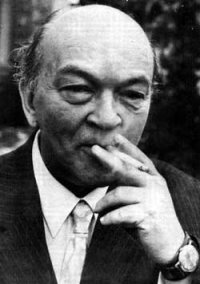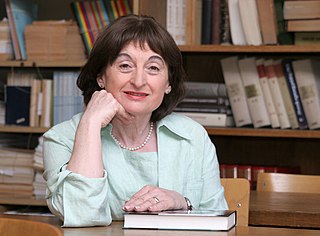
Vatroslav Jagić was a Croatian scholar of Slavic studies in the second half of the 19th century.

Antun Branko Šimić was a Croatian expressionist poet, considered to be one of the most important poets of Croatian literature of the 20th century.

Petar Preradović was a Croatian poet, writer, and military general. He was one of the most important Croatian poets of the 19th century Illyrian movement and the main representative of romanticism in Croatia.

Enver Čolaković was a Bosnian novelist, poet and translator, best known for his 1944 novel The Legend of Ali-Pasha. During the later stages of World War II he served as a cultural attaché to the Independent State of Croatia embassy in Budapest. After the war he spent the rest of his life in Zagreb, where he published a number of literary translations from Hungarian and German.

Goran Tribuson is a Croatian prose and screenplay writer.
Ranko Matasović is a Croatian linguist, Indo-Europeanist, and Celticist.
Antun Šoljan was a Croatian writer in a period of Cold War who appeared as a part of the literary magazine Krugovi. Šoljan was active as a poet, novelist, short story writer, essayist, literary critic and translator.
Slobodan Prosperov Novak, is a Croatian literature historian, comparativist and theatrologist.

Franjo Marković was a Croatian philosopher and writer.
Vladimir Dvorniković was an ethnic Croat and politically Yugoslav philosopher, ethno-psychologist, and a strong proponent of a Yugoslav ethnicity. He was a professor at the University of Zagreb during the 1920s. Dvorniković was also an advocate of psychologism and animal philosophy. He is best known for authoring the book "Characterology of the Yugoslavs."
Eduard Hercigonja was a Croatian philologist, Croatist and literary historian. University professor and a member of the Croatian Academy of Sciences and Arts, he authored several fundamental works on medieval Croatian literature and culture.
István Blazsetin was a Croatian writer, cultural worker and pedagogue from Hungary. According to some authors, he is considered to be a Croatian writer from Vojvodina, Serbia. He wrote poetry, novels and children's literature. Blažetin was an important collector of oral literature heritage of the Pomurje Croats.

Maja Bošković-Stulli was a Croatian slavicist and folklorist, literary historian, writer, publisher and an academic, noted for her extensive research of Croatian oral literature.

Ivan Focht was a Yugoslav philosopher and mycologist.
Nikola Đuretić is a Croatian writer and publisher. At the age of five he moved to Zagreb where he graduated in English studies and Comparative Literature. He published his first short stories in the magazine "Polet" in 1968. From 1975 until 1978 he worked as an editor in publishing. In March 1978 he went into exile. For more than twenty years he lived in London, UK, where he worked as a program assistant and senior producer with the BBC. Upon retiring from the BBC in 1999 he returned to Croatia. He is a member of the Croatian Writers' Association and Matrix Croatica. For years he's been a member of the Organizing Committee of the Zagreb Literary Talks which he presided upon from 2008 until 2011.

Irena Lukšić was a Croatian writer, translator, scholar and editor. She was born in a middle-class family, her mother Zora was en economist, and her father Zdenko an administrative lawyer. In her town of birth she completed her primary and secondary education, and she graduated in Comparative Literature and Russian Language from the Faculty of Philosophy at Zagreb University. She also studied journalism at the Faculty of Political Sciences in Zagreb She obtained her doctoral degree with a thesis on Russian emigrants' literature. Her first critical reviews were published in the mid-1970s, in a music magazine. At the time she started collaborating as translator with a number of editions of Vjesnik newspaper. Short stories published in various magazines in the late 1970s marked her literary debut. The year 1981 saw the publication of her first novel Hostel for Train-escorting Personnel, which the literary critics immediately included in the category of so-called prose in jeans, i.e. youthful rebellion against authority and social restrictions. The novel Seeking a Spoon and the collection of short stories Seven Stories or One Life may be said to belong to a similar stylistic formation, while the short-story collection Nights in White Satin (1995) is characterized by a postmodernist view on reality as a game in language. The novel Return of the Broken Arrow (2000), dealing with the war in Croatia, indicates a turn towards reality. Accordingly, the novel Celestial Cyclists (2008) is set in the 1960s and interspersed with documentary material from the sphere of pop-culture, and the book of travel prose Desperately Foreboding Cohen (2013) is based on cultural references important to the 20th century and the literary procédé typical of the adventure genre.
Sanda Ham is a Croatian linguist and publicist. She is editor of the Croatian linguistic magazine Jezik.
Neven Budak is a Croatian historian and professor at the Faculty of Humanities and Social Sciences, University of Zagreb.

Dubravka Oraić Tolić is a Croatian poet, essayist, translator, and theorist of literature and culture.
Vlaho Stulli, was a Croatian and Ragusan poet, playwright and public servant of the Republic of Ragusa. Influenced by Croatian-Ragusan writers Nikola Nalješković and Marin Držić, as well as Italian Carlo Goldoni, he is best known for his naturalistic satire comediographic work Kate Sukurica in Croatian, Diario (Diary) in Italian and epigrams in Latin language, written to his friends. Stulli lived and wrote during the period of the stronger influence of the French language and literature in Dubrovnik, whose writers and playwrights translated many of Molière's comedies into Croatian, adapting them to local idiom and mentality, as well as influences of Latin language, Italian language theatre troupes and style-pluralistic Croatian literature; the 18th century being considered the "golden century" of Ragusan literature. Stulli is the most prominent representative of the late 18th-century Ragusan drama and his comedy Kate Kapularica the best Ragusan play of that time.










